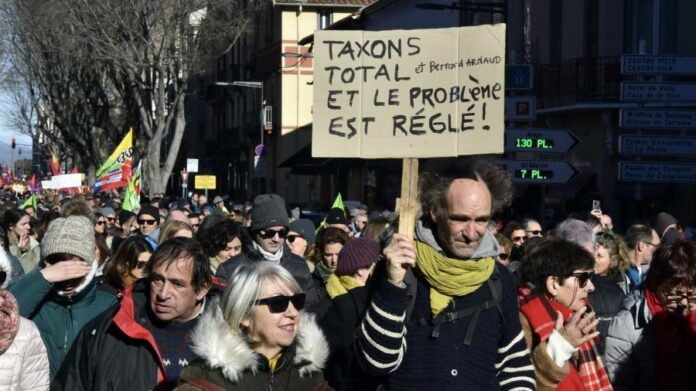Emmanuel Macron’s unpopular plan to raise the retirement age by two years to 64 has ignited a debate in egalitarian-minded France: are the billionaires to blame?
As labour unions held a second massive strike on Tuesday, which drew hundreds of thousands of people on to the streets across the country, leftwing politicians have gone on the attack to argue that taxing the super-rich would be a better way to plug deficits in the state-run pension system.
In particular, Bernard Arnault, the world’s richest man and owner of French luxury group LVMH, has become a lightning rod with protesters at recent marches carrying signs with his face on a wanted poster and exhorting him to do more for the common good.
François Ruffin, a member of parliament for the Somme region and prominent figure in the leftwing Nupes alliance, has been particularly vocal in linking the debate over pensions reform and the way wealth is shared (or not) in French society.
“The billionaires have only gotten richer since the Covid-19 pandemic, Macron refuses to tax windfall profits made by our biggest companies, and somehow all the effort to fix the pensions problem must fall on the shoulders of workers?” he said in an interview.
“This is a moment to fight for the kind of society we want — not one where capital crushes labour and people are just consumers.”
It is easy to dismiss this as typical soak-the-rich talk that often surfaces in France where wealth is viewed with suspicion. But there is more to it.
Soon after his 2017 election, Macron was nicknamed “president of the rich” by opponents for his pro-business agenda. His government has cut taxes paid by companies, reduced unemployment benefits and, most controversially, scrapped a wealth tax.
Opponents of Macron’s pension reform — which would raise the retirement age from 62 to 64 and accelerate the transition from 41 to 43 years of contributions for a full pension — see it as part of a series of policies that favour the wealthy and businesses over working people.
Government officials rebut that by pointing to declining unemployment and strong foreign direct investment figures as proof, the Macron economic agenda has paid off. Plus the government has been generous with aid to blunt the pain first of the pandemic and inflation touched off by the energy crisis, they argue.
Nevertheless, the “president of the rich” critique has been ably exploited by far-right leader Marine Le Pen to rack up votes among blue-collar workers, helping her party win an unprecedented 88 seats in the National Assembly in June. Meanwhile, the far-left standard bearer Jean-Luc Mélenchon has used Macron as a foil to argue that capitalism and globalisation are discredited models that must take a back seat to social justice and fighting climate change.
Given this political backdrop, the choices Macron made in his retirement proposal may prove risky. To fill the deficits caused by there being fewer workers for every retiree in coming decades, he wants everyone to work longer. It is a burden that weighs more heavily on people who start work at a younger age and those with physically challenging jobs.
He also set out red lines: companies would not be asked to pay higher taxes, nor would current retirees, even the wealthier ones, be asked to contribute.
The left objected and promptly identified supposed alternatives, while also calling for the retirement age to be brought back down to 60. Oxfam declared that all it would take was a 2 per cent tax on France’s billionaires to plug the €12bn annual pension deficit expected by 2027. One leftist lawmaker tweeted that French start-ups had raised €13.5bn in 2022 so why not look there, while Mélenchon’s party compared the pensions deficit to the €80bn in dividends paid by companies in France’s blue-chip CAC 40 index.
These ideas make little economic sense, but they do not have to for them to be good politics. Polls show almost three-quarters of French oppose raising the retirement age.
Ruffin, a former journalist who rose to fame by making a muckraking documentary about Bernard Arnault, long ago realised the power of personalising the confrontation between capital and labour. “Bernard Arnault does not have 400,000 times more merit than the workers sewing handbags on his production lines,” he said.
Arnault hit back on Thursday as he unveiled LVMH’s record annual profits, arguing that group had hired 15,000 people in France last year and paid €4.5bn in taxes and social charges in its home market.
None of that will stop Ruffin. “We have to capitalise on this moment,” he said.






